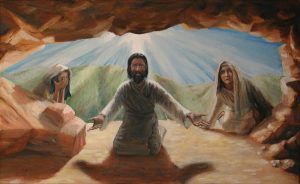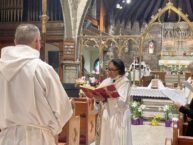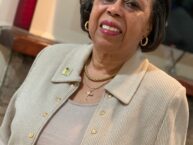 March 29, 2020: May God’s words be spoken, may God’s words be heard. Amen.
March 29, 2020: May God’s words be spoken, may God’s words be heard. Amen.
These are troubling times for us all. The world, our country, our communities, and our families – we are all facing the growing concern for our health, our jobs, for those who care for others, and for our loved ones.
So, perhaps the stories today in Ezekiel and the Gospel of John are hitting a little too close to home – filled with death and dying. Yet they are the very good news for us in this moment, because it is times such as this that bring us to wonder about how the world works, how God works – and these passages hold a truth we need to hear.
In Ezekiel, it is the story about God calling him to prophesy to a whole lot of old dry bones lying in a valley – the bones being a metaphor for the people of Israel – telling them that God will lift them from their graves and instill God’s very spirit within them.
And in our gospel, we get the story of the raising of Lazarus – which, if you use that age old classic – the King James Version – has both the shortest verse in the bible, for those of you who are trivia fans… “Jesus wept,” and the one of the weirdest too. Martha and Mary’s brother, Lazarus, has died, and is buried. Jesus, their friend, wants the stone rolled away from the tomb. As Lazarus has been dead for four days- they tell him that there will be an odor, or more precisely: Martha tells Jesus: “Lord, he stinketh!” You gotta love it.
And of course anyone could imagine he would “stinketh” wrapped up in a tomb for several days. Yuck! My response would have been – you roll away that stone – I’ll watch from a safe distance. Anyway, I guess one doesn’t argue with the Son of God, so they did roll the stone from the opening of the tomb.
But let’s step back a moment to really see why this gospel and this story of the prophet Ezekiel with a bunch of dry bones, is so important and timely for us now. In the gospel, Jesus, the one who brings sight to the blind, who has healed many, who has fed thousands, is told that the one he loves, his friend Lazarus, is dying. And yet, oddly enough, he decides to take his good sweet time getting to his bedside.
Now I don’t know about you, but if someone I loved was dying, and I could save them, I would high tail it to wherever they were. Even if I couldn’t save them, I would at least want to say goodbye, to console and be consoled by those who also loved them. But…Jesus, our savior – well…he lingered, took his time, and did not get there until Lazarus had died.
This is when, I think, most of us come to really empathize with Martha’s outright statement to Jesus – “if you had been here, he wouldn’t have died.” I love this encounter with Martha, Lazarus’ sister, because in her we see the anger that many of us feel in times of great loss.
Who could blame her? She truly believes in Jesus. She put her trust in him. Yet he didn’t seem to care about her pleas for help.
One of my favorite commentators, the Rev. Dr. David Lose, put it this way. He said, “I once heard a sermon that began with these few words, “And Jesus tarried…,” and in the pause that followed I was surprised by the unbidden emotion and tears that welled up at the recognition of how often it feels that God is tarrying.”[1]
Indeed. And I imagine that many are feeling that way right now, perhaps some of you. We can easily place ourselves in Martha and Mary’s sandals – waiting in hope, and when help does not seem to come, despairing our loss. We feel so very dead, like Lazarus – worn right down to the bone like those in the valley.
And that is why these are important stories for us to hear, because, like our blind man last week, we are the very characters we are hearing about. So yes, we understand Mary and Martha, we are them grieving and in pain, angry at what is happening – we are also Jesus weeping. But, perhaps most of all, we are also Lazarus, we are Ezekiel, we are the dry bones.
The truth, if we really think about it, is that we all find ourselves in the tomb from time to time – in those dark places where death seems to “stinketh” all around us. Where we are experiencing the darkness and cold of the tomb of isolation, fear, oppression, loneliness, anxiety, and depression. Where it seems that we are forgotten and pushed to the margins, lying dead and lost in that dry valley. When it seems that God did not come for us. That God is tarrying when we are most in need.
These are the valley of dry bones moments. These are the times in the tomb.
We are there now, are we not?
Day after day our news cycle is an ever present stream of rising numbers of those who have the virus, or have died from it – of emergency health workers unable to keep up despite their bravery in the face of a lack of protective equipment – and of the leader of our nation, rather than uniting us and guiding our country in a time of crisis, drowning us all in his ineptitude and deceit.
This is a time of dry valleys and tombs.
And it is usually these times when we would gather close to one another – but we can’t. These are the times when we would go to the hospital to care for those we love – but we can’t. These are the times we would gather here in our churches to feel closer to each other and to God – but we can’t. We can feel like those dried bones “our hope…lost; [as] we are cut off completely.” We weep with Mary, Martha, and Jesus.
And while we know, or should know, that God does not cause these dry bones and tomb experiences in our lives, they often are when we discover a truth about ourselves – and about God – when will learn a lot about what we really believe, and what matters most to us. Because it is then, most of all, when we truly experience God’s presence – because God will always meet us there, in our darkest hour – when it seems that all hope has been lost. God will come for us and unbind us from our pain, and instill new life into our dry bones.
For Lazarus, Martha, & Mary, for those old dry bones, and for each of you – God meets us where we are, and calls us to new life.
And God is with us now!
That, my friends, is good news for us all!
And here’s the kicker folks – we have a part to play in this…we are not without purpose. While God will always be there in the valleys and tombs, God also chooses us to be an active agent in Her work, perhaps because God truly understands that the root of hopelessness is a feeling of helplessness.
In both the stories today – Ezekiel with the bones and the raising of Lazarus – the new life didn’t come fully into being as an act of God alone. God could have brought sinew to those old bones without any help from Ezekiel, but God wanted the work of new life for those people to come through a partnership with humanity. And in our gospel, when Jesus commands Lazarus to “Come out!” he emerges slowly – quite possibly because he hasn’t moved in days (which, if you have been on a never ending stream of Zoom meetings this week, may feel familiar), but also because he is completely bound up! And Jesus tells his followers to “Unbind him.” He could have removed those wraps himself, but he didn’t. He called others into this act of new life.
We are called to be partners with God in God’s redemptive acts from the beginning of time! God, the one who calls us into relationship, who comes to us in our darkest moments, seeks to work in us and through us that together we may bring about God’s dream for us all.
That is the gift we are being given! That is the miracle!
When we are in our own tomb moments, our own times of lying in the valleys, the Holy Spirit will breathe the very Spirit of God in us, Jesus will come get us, and God is always with us. And as we emerge from our tomb, when we rise up from the dry dust of the valley, God wants to work through us to help to heal a broken world – to quench the thirst of the spiritually dead. Christ is calling us to unbind our sisters and brothers from injustice.
What might that look like for you – particularly in this time of separation?
Well, perhaps this prayer, one of my favorites from the Book of Common Prayer, will help. It is from the Ministrations to the Sick:
“This is another day, O God. I know not what it will bring
forth, but make me ready, God, for whatever it may be. If I
am to stand up, help me to stand bravely. If I am to sit still,
help me to sit quietly. If I am to lie low, help me to do it
patiently. And if I am to do nothing, let me do it gallantly.
Make these words more than words, and give me the Spirit
of Jesus.” (BCP 461, adapt.)
This partnership with God has many expressions, many opportunities for each of us to be a part of bringing life, love, and healing – even now, in this time.
So we are left to consider – what dry valleys are we lying in? What fears, pains, anger, grief, anxiety bind us in a tomb of despair? Where are we being called to rise up from our spiritual or emotional death? God is wanting to breathe new life into us – calling us out of our darkness that we may be God’s active agent in changing the world.
Can you imagine that?
You need to.
We all need to.
Because that is exactly what this whole Lenten journey toward Jerusalem that we have been on is all about. That is what our entire lives in Jesus is all about.
We are Ezekiel and those bones.
We are Mary, Martha, and Lazarus,
We are the body of Jesus Christ!
Let us rise up from our dry valley.
Let us step forward from what binds us.
For God is with us.
Jesus is calling us.
And the Holy Spirit is breathing new life into us and leading us out…
To prophesy, to unbind, and to bring about God’s vision of healing, of wholeness, of unconditional love to a world of dry valleys and tombs.
Amen.
For the audio from the 10:30am service, click below, or subscribe to our iTunes Sermon Podcast by clicking here:
[1] https://www.workingpreacher.org/craft.aspx?post=1545
The Rev. Diana L. Wilcox
Christ Church in Bloomfield & Glen Ridge
March 29, 2020
Lent 5
1st Reading – Ezekiel 37:1-14
2nd Reading – Romans 8:6-11
Gospel – John 11:1-45






